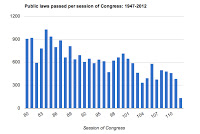Roll Out the Barrel (We’ll Have a Barrel of Funds)
 Bloomberg Businessweek is the latest to float the idea that earmarks might provide some impetus for Congress:
Bloomberg Businessweek is the latest to float the idea that earmarks might provide some impetus for Congress: Political hacks used to say pork was the political grease that
lubricated legislative deals. Only now do we see how true that was.
Would it really be so terrible to reintroduce some congressionally
sanctioned bribery? That would let members lay claim to the odd million
in the interest of striking a deal worth much more.
We are loathe to think of ourselves as “hacks” (most of our contemporaries probably think we are), but the sentiment is sound.
most difficult of the appropriations bills to pass. It contains funding for a
variety of programs that are opposed by conservative Republicans, and contains
provisions on hot-button social issues like abortion and stem cell research.
Using earmarks and other forms of persuasion the Republican leadership was able
to piece together a majority in support of the House version of the Fiscal Year
2006 Labor-H Appropriations bill. The House passed their version of the bill by
a vote of 250 yeas to 151
nays; 206 Republicans and 44 Democrats voted for the bill while 10
Republicans, 140 Democrats, and 1 independent voted against the bill.
and the House and Senate met in conference to reconcile the differences between
the two versions of the bill. A decision was made in conference to remove
$1 billion dollars in earmarks from the bill in favor of increased funding for
the National Institutes of Health, and other initiatives favored by Senators
Spectre (R-PA) and Harkin (D-IA), leaders of the Senate subcommittee.
When the bill returned to the House the Conference Report on
the bill was defeated in the House 209 yeas to 224 nays.
This time 22 Republicans voted with 201 Democrats (all voting Democrats) and 1
independent to reject the bill. In all, 85 members who had previously supported
the bill in the House changed their votes when the bill returned to the House
floor from Conference. The one major difference between the original
House version and the Conference version was the $1 billion dollars in earmarks
that were removed from the Conference Report. Stripping the earmarks upset the delicate balance necessary to pass a
controversial bill.
In
2012 the House didn’t even consider the FY 2013 LHHS bill on the floor– the
Appropriations Committee could not even vote out a bill out of committee.
It has been years since Congress passed all of the Appropriations bills following regular order. Republican House leaders have resorted to omnibus and “minibus” bills and continuing resolutions to fund government.
Forget authorizing legislation. Congress is all but impotent.
Perhaps adding a little fiber to the diet might help?
